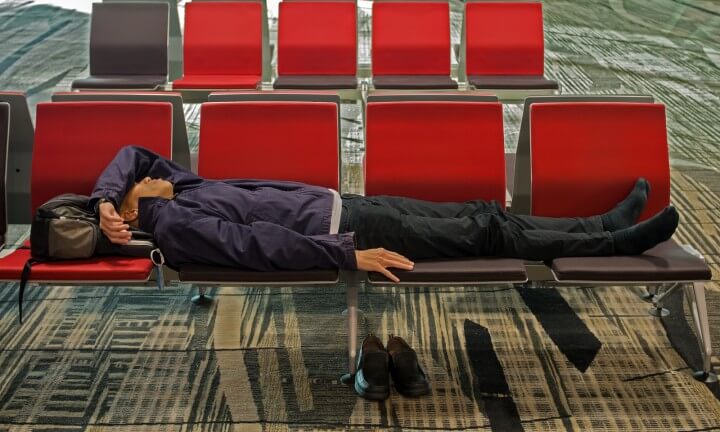For those that travel often, you know the feeling of jet lag. The feeling after a restless sleep when your head feels full of cotton balls. The feeling when you wake up in the morning, but you’re not ready to get out of pajamas and into a stiff, crisp suit. But you have no choice because you have a business meeting in an hour. Not just any business meeting, either. This meeting has the power to determine the future direction of your whole company. Yet, there you are, suffering from a classic case of jet lag.
Here are 6 Tips to Beating Jet Lag When You Travel.
What Causes Jet Lag?
Jet lag happens when your internal clock is no longer in sync with the time of day: the unfortunate result of traveling across time zones. Your internal clock is also called your circadian rhythm. Our bodies instinctively know when it is time to be awake and sleep. Light during the day and darkness at night teach your body how to set its internal clock.
Here is the good news–you can stay productive through all the time changes and grueling schedules. Before your next trip across time zones, try these 6 tips to beat the jet lag:
-
Sleep Right:
When you’re traveling east, start going to sleep one hour earlier each night for a couple of nights before you leave. You will be jumping ahead in time when you arrive. This means you want to get your body slowly acclimated to your new schedule. If you’re traveling west, you will be going backward in time of day, so prepare by going to sleep a bit later for a few nights prior to your trip.When you arrive, don’t give in to your exhaustion from travel and take a nap. Make sure to go to sleep at your normal bedtime.
-
Light Therapy:
Light therapy works by fooling your brain into thinking it is daytime when, in fact, it is not. Scientists at the Stanford University School of Medicine found that having a light flashing in your room at night is actually more effective than a light that is on continuously. Participants in the study who slept in a room with the flashing light gained two extra hours of wakefulness than they would have without light therapy. Participants who had on a steady light box gained only 36 minutes of extra wakefulness—still helpful, but not as effective. Scientists recommend using this light therapy the night before you cross time zones. Light therapy lamps are not hard to find – you can purchase one on Amazon in varying sizes and prices.Any kind of exposure to bright light is helpful in letting your body know it is time to be awake. When you arrive at your destination, spend as much time outdoors in the sunlight—or indoors with the shades open—as you can.
-
Drink Right:
The low air pressure on the plane can dry you out and make you dehydrated. Dehydration can make the symptoms of jet lag feel worse. Make sure to drink plenty of water while flying.
-
Eat Right:
Some experts believe that if you fast right before and during your flight, it will help your body acclimate to the change in time. Eating at the appropriate mealtime in your new time zone is important in nudging your body into resetting its internal clock.
-
Exercise:
Though not 100% proven, exercising outside during the day may help your body adjust to its new time zone. The sunlight works like light therapy, by signaling to your body that it is daytime, and the movement can increase blood flow and waken your muscles.
-
Melatonin:
Another recommendation by experts is melatonin. Melatonin is actually a hormone that influences your circadian rhythm. When you have an increase of melatonin in your body, you feel tired. If you take melatonin before going to bed while traveling, it will help you become tired enough to sleep. It’s important to note that melatonin should only be taken once you arrive at your destination. Experts recommend taking it one hour before going to bed for a few nights. In studies, scientists found that a person only needs a small dose of melatonin (0.5 mg) to feel the effects.
The next time you need to travel across time zones, try some of the above tips. Then, instead of fighting the urge to yawn at an important meeting or social event, you will be alert and ready to make an impression. With a bit of advance planning, you can tackle jet-lag before it ever gets a chance to tackle you.



